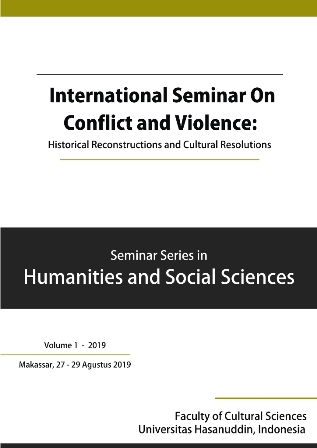CENTRAL ACEH REGIONAL ELECTION IN 2017 : BETWEEN CONTESTATION AND ALLIANCE INTER-BELAH
DOI:
https://doi.org/10.3405/ssihss.v0i1.8621Abstract
This paper focuses on issues of political identity where the use of the issue of kinship in the Central Aceh Regional Election competition in 2017 is too thick. Kinship for the Gayo community in Central Aceh Regency becomes the basis for determining their political choices, which have a "tradition" to divide their community into two belah (clans), namely Uken-Toa.The purpose of this paper is to see the phenomenon of how the Uken-Toa issue is used by the Gayo community as a reference in selecting candidates for the Central Aceh regent in the 2017 regional election. Qualitative research techniques with ethnographic methods start to involve direct observation (observation of participation) and free and in-depth interviews conducted during the research in the field.In the journey of its history in Gayo, Uken and Toa are endless issues to be discussed, these two Gayo sub-tribes almost never "make peace". The competition between Uken and Toa in Gayo almost covers all sectors of life, including in the implementation of the 2017 regional elections. But when we noticed again, the political use of Uken-Toa in the 2017 regional election presents different fragments compared to the pre-reform period. At present, the fragmentation between Uken-Toa is no longer to posit both of them as an opponent but makes them united.We can see how the duality of the Uken and Toa groups as a mechanism for the distribution of the Gayo community which initially leads to a cultural competition between the two, but at present, it has been reconstructed as a mechanism to build alliances for the sake of winning the election in Central Aceh District. Thus, the paradigm of the Uken-Toa relationship now has transformed from the competition paradigm shifting to the alliance paradigm, and political interest factors are the main factors driving this transformation.Keyword: Gayo, Uken-Toa, belah, kinship, regional electionDownloads
References
Afif, Afthonul. 2015. Teori Identitas Sosial. Yogyakarta: UII Press.Al-Gayoni, Yusradi Usman. 2012. Tutur Gayo. Jakarta: Pang Linge – RCfG.Bowen, John R. 1991. Sumatran Politics and Poetics: Gayo History, 1900-1989. Yale University.Geertz, Clifford. 1992. Tafsir Kebudayaan (Terjemahan). Yogyakarta: Penerbit Kanisius.Hurgronje, C. Snouck. 1996. Gayo Masyarakat dan Kebudayaan Awal Abad ke-20 (Terjemahan). Jakarta: Balai Pustaka.Ibrahim, Mahmud dan AR. Hakim Aman Pinan. 2010. Syariat dan Adat Istiadat Jilid 1. Takengon: Yayasan Maqaammahmuda.Melalatoa, M.J..1983. “Pseudo Moiety Gayo: Satu Analisa Tentang Hubungan Sosial Menurut Kebudayaan Gayo”. Disertasi, Jakarta: Universitas Indonesia.Melalatoa, M. Junus. 1982. “Meneliti Pembangunan Masyarakat Desa Gayo di Aceh Tengah”, dalam Koentjaraningrat dan Donald K. Emmerson (ed.). 1982. Aspek Manusia Dalam Penelitian Masyarakat. Jakarta : PT Gramedia.Mukhlis. 1988. “Belah di Masyarakat Gayo”. Dalam M. Yahya Mansur. 1988. Sistem Kekerabatan dan Pola Pewarisan. Jakarta: Pustaka Grafika Kita.PaEni, Mukhlis. 1977. “Belah di Masyarakat Gayo: Studi Kasus di Kebayakan”, Kertas Hasil Penelitian. Banda Aceh: Pusat Latihan Penelitian Ilmu-Ilmu Sosial.PaEni, Mukhlis. 2003. Riak di Laut Tawar: Kelanjutan Tradisi dalam Perubahan Sosial di Gayo Aceh Tengah.Pinan, AR. Hakim Aman. 1998. Hakikat nilai-Nilai Budaya Gayo (Aceh Tengah). Takengon: Pemda Kabupaten Aceh Tengah.Spradley, James P. 1997. Metode Etnografi. Yogyakarta: Tiara Wacana Yogya.Wiradyana, Ketut dan Taufiqurrahman Setiawan, 2011. Merangkai Identitas Gayo. Jakarta: Yayasan Pustaka Obor Indonesia.Barter, Shane Joshua. 2015. "Between a rock and a hard place: second-order minorities in the Aceh conflict". Asian Ethnicity, 2015, Vol. 16, No. 2, hlm. 154, http://dx.doi.org/10.1080/14631369.2015.1003689.Bowen, John R. “Poetic Duels and Political Change in the Gayo Highlands of Sumatra” American Anthropologist, New Series, Vol. 91, No. 1 (Mar., 1989), pp. 25-40 (http://www.jstor.org/stable/679736).Hasbullah. “Agama dan Etnisitas di Pentas Politik Lokal” dalam Jurnal Ushuluddin Vol. XVII No. 2, Juli 2011, (170-182).Suryandari, Nikmah. 2007. “Eksistensi Identitas Kultural Di Tengah Masyarakat Multikultur Dan Desakan Budaya Global”. Dalam Jurnal Komunikasi, Vol. XI No. 01, Maret 2017: 21-28 (DOI: http://dx.doi.org/10.21107/ilkom.v11i1.2832)Nur, Win Wan. 2011. “Dinamika Sosial Politik Aceh Tengah bagian II: Aceh Tengah di Bawah Kepemimpinan Nasaruddin” dalamhttp://www.lintasgayo.com/5986/dinamika-sosial-politik-aceh-tengah-bag-ii.html (akses: 6 November 2016).

